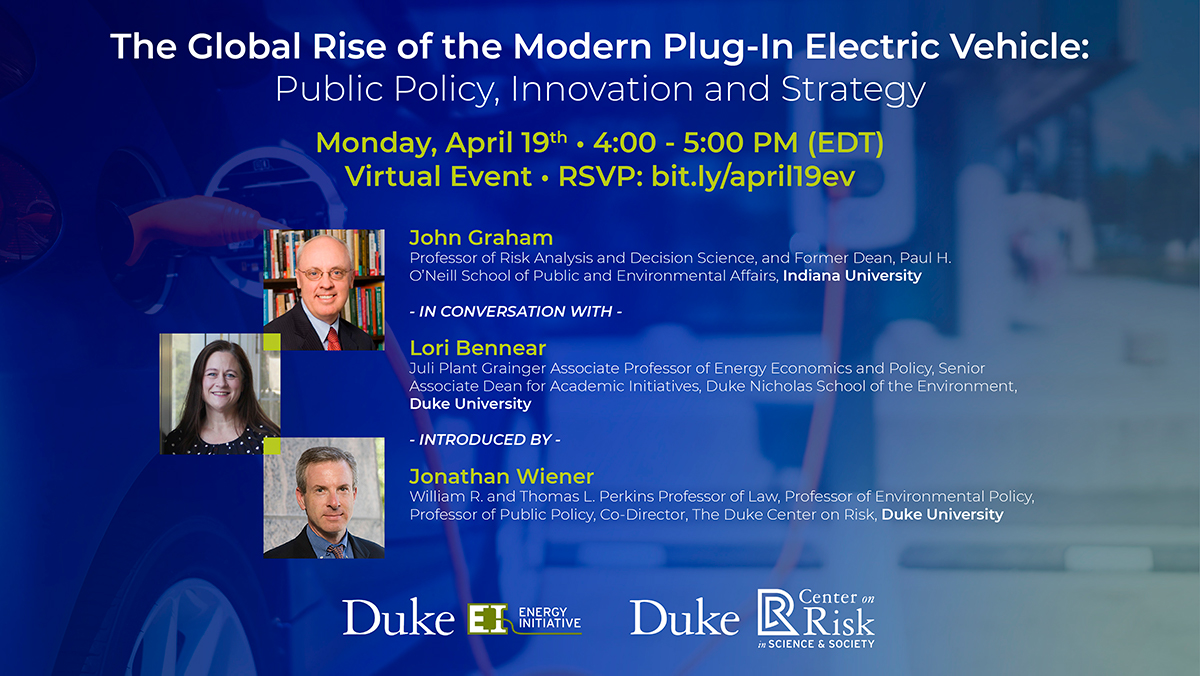The Global Rise of the Modern Plug-In Electric Vehicle: Public Policy, Innovation and Strategy
Time
April 19, 2021 4:00 pm - 5:00 pm
Event Details
Co-Hosted
Event Details

Co-Hosted by the Duke Center on Risk in Science & Society and the Duke University Energy Initiative.
We may be standing at the precipice of a revolution in propulsion not seen since the internal combustion engine replaced the horse and buggy. The proliferation of electric cars will change the daily lives of motorists, boost some regional economies and hurt others, reduce oil insecurity but create new insecurities about raw materials, and impact urban air quality and climate change. How quickly will this transition likely occur, and what factors will shape it?
In this discussion of his new book of the same title, Dr. Graham focuses on the period from the oil crises of the 1970s to the present, tracing the development of an entirely new industry and its critical supply chain and delving into the major societal concerns, economic rationales, governmental policies and corporate strategies. He emphasizes that consumer concerns slowed the pace of the transition while spurring more innovation and new policies to persuade reluctant consumers. And he explains why the transition is now occurring much faster in China and Europe than in Japan and the United States. More broadly, Dr. Graham tells the story of many successes and failures in public policy, technological innovation, and corporate strategy.
Panelists
John D. Graham is Professor of Risk Analysis and Decision Science and former Dean (from 2008-19) of the O’Neill School of Public and Environmental Affairs at Indiana University. Previously he was Dean of the Pardee RAND Graduate School from 2006-08, and Professor of Policy and Decision Sciences at the Harvard School of Public Health from 1985-2001 where he founded and directed the Harvard Center for Risk Analysis from 1990-2001. He served as Administrator of the Office of Information and Regulatory Affairs (OIRA) in the U.S. Office of Management and Budget (OMB) from 2001-06. He was President of the Society for Risk Analysis (SRA) in 1995, and he received the SRA’s Distinguished Achievement Award in 2008. He is an elected Fellow of the National Academy of Public Administration. His books include The Global Rise of the Modern Plug-In Electric Vehicle (2021), Fifty Years of the US EPA (2021) (with Barnes and Konisky), Risk vs. Risk (1995) (with Wiener), Auto Safety: Assessing America’s Performance (1989), and Preventing Automobile Injury (1988). He earned his BA from Wake Forest University, MA from Duke University, and PhD from Carnegie Mellon University.
Lori S. Bennear is the Juli Plant Grainger Associate Professor Energy Economics and Policy at the Nicholas School of the Environment at Duke University. She received her Ph.D. in Public Policy from Harvard University (2004) and also earned an MA in Economics from Yale University (1996) and an AB in Economics and Environmental Studies from Occidental College (1995). Her research focuses on evaluating the effectiveness of flexible environmental policies including information disclosure regulations, management-based regulations, liability regimes, and demand-side management programs. She has applied these evaluations across a range of environmental domains including energy, toxics, and drinking water. Her co-edited book Policy Shock: Recalibrating Risk and Regulation after Oil Spills, Nuclear Accidents and Financial Crises was published by Cambridge University Press in September 2017. She is currently working on developing best practices for adaptive regulation of emerging technologies in the energy domain, including deepwater oil/gas, offshore wind, and electric and autonomous vehicles.
Jonathan B. Wiener is the Perkins Professor of Law, and Professor of Environmental Policy and Public Policy, at Duke University. With Prof. Mark Borsuk, he co-directs the Duke Center on Risk, in the Science & Society Initiative; and he is a member of the faculty committees of the Energy Initiative and the Nicholas Institute at Duke. He is a University Fellow of Resources for the Future (RFF). He was previously President of the Society for Risk Analysis (SRA) (2008), and a chapter lead author of the Intergovernmental Panel on Climate Change (IPCC) in its 5th Assessment Report (2014). His books include Policy Shock (2017) (with Balleisen, Bennear and Krawiec), The Reality of Precaution (2011) (with Rogers, Hammitt and Sand), Reconstructing Climate Policy (2003) (with Stewart), and Risk vs. Risk (1995) (with Graham). He earned his BA (economics) and JD from Harvard University.
Comments are closed.

